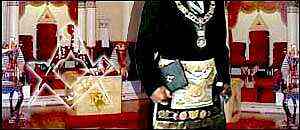




Wednesday, May 26, 1999 Published at 14:22
GMT 15:22 UK
The strange apparel, mythological terminology and role-playing
ceremonies - all important elements of The Craft - have long fuelled
perceptions of the organisation as a pseudo-religion or cult.
Suspicions of masonic "networks" covering up for members within
professions, including the police and judiciary, have most recently led to
a well-publicised inquiry and subsequent report entitled Freemasonry in
Public Life.
The organisation claims the
report's findings - that it was not the primary cause of problems within
the now disbanded West Midland Serious Crime Squad, and that it played "no
significant part" in the investigation into the Birmingham pub bombings or
the Stalker affair - as "vindication".
Yet its perceived status as an underhand group of self-serving white
middle class males - as well as a determination to "out" members -
persists.
With a history claimed by some to go back to the reign of King Solomon,
it has, according to members, only been Freemasonry's secretive practices
of the post-war years that have lead to bad press.
Following persecution suffered by Freemasons under the Nazis, and the
accusations that were levelled at the organisation, it decided to "go into
its shell".
'Completely open'
Spokesman for the United Grand Lodge of England and serving magistrate,
Chris Connop, said Freemasonry was now "completely open".
Lodges across the UK now hold open days to encourage members of the
public to see what the Freemasons do, he said. One area has even
advertised in the local press for members.
The Masonic Hall and its museum in London's Covent Garden are open to
the public for guided tours.
"Freemasonry went into its shell and shut out the outside world after
the persecution of Hitler and general bad feeling after the Second World
War.
"Before that,
it was a very open organisation. Now, again, we are encouraging members to
be open.
"The problem is that some people fear they will be discriminated
against if they reveal that they are a member," he said.
Masonic applicants have to be proposed and seconded by existing Lodge
members. That done, they are interviewed by a panel of masons before they
are allowed to join.
"One of our most important criteria for joining is that an applicant
has no criminal record," says Mr Connop.
Lodges generally congregate four times a year in Temples. Meetings are
formally opened, the minutes of the last meeting are read and then
business commences.
Ritualistic ceremonies
Ritualistic ceremonies - which are, say Freemasons, nothing more
sinister than morality plays - are acted out and last about half an hour.
The origins of Freemasonry are obscure, but they go back at least 400
years.
It is generally accepted that the organisation evolved from travelling
stone masons who made the medieval cathedrals and castles.
They would meet in lodges and hold initiation ceremonies for
apprentices. Modern paraphernalia still includes aprons and tools.
But despite the organisation's protestations that their practices are
not secretive, they are not keen to divulge the exact nature of these
ceremonies, saying it would be like telling a potential movie-goer the
outcome of a film.
"Freemasonry is not a religion. Belief in a supreme being is a
pre-requisite for joining, but it does not matter which supreme being that
is," said Mr Connop.
"It could be the Christian God,
the God of the Jewish Old Testament, Allah, or whatever name the supreme
being of any religion goes by.
"Freemasonry actually explicity forbids discussion of anything to do
with religion or politics, which is what makes it such an enjoyable hobby
for so many people," he added.
The UK's 340,000 Freemasons - there are also lodges which are made up
exclusively of Lady Freemasons - are also expressly forbidden to promote
their own interests through membership.
Mr Connop said: "Maybe a few bad apples have soured the public's
perception of us, but using Freemasonry for your own ends is, in our
terminology, a 'foul'."
Disciplinary procedure
He added: "We have a disciplinary procedure which is most frequently
used when a member has been found guilty of committing a criminal act, but
it is used for masonic wrongdoing as well."
Seeking promotion on the grounds of being a freemason, for example,
said Mr Connop, was an offence which could lead to exclusion.
"The organisation aims to help members improve themselves as human
beings. It is all based on building, and the principle is to build a
better person inside oneself.
"We see the inquiry as a witch hunt," he added, "Everyone accepts that
business deals are made on golf courses, but golf clubs are not required
to reveal their members' names.
"We are being discriminated against in a way that is quite unjust and a
breach of the European declaration of human rights.
"We are not corrupt, we do a great deal of work for charity. The way we
are regarded is insulting and deeply wrong."
Whether that position dispels the continuing suspicion remains to be
seen.
UK Freemasonry in the News, have the 'Brethren' finally met their Waterloo?
The Craft

The organisation is
perceived as a pseudo-religion ![]()
For many people in the UK, the word
"freemasonry" is shorthand for shady goings-on and secret agendas.
![[ image: Paraphernalia is associated with the tools of stone masonry]](pics/_353412_masonic150.jpg) Paraphernalia is
associated with the tools of stone
masonry
Paraphernalia is
associated with the tools of stone
masonry
![[ image: Freemasons insist it is not a religion]](pics/_353412_temple150.jpg)
Freemasons
insist it is not a religion
![[ image: Freemasonry is seen as a world of secret handshakes and shady dealings]](pics/_353412_handshake150.jpg) Freemasonry is
seen as a world of secret handshakes and shady
dealings
Freemasonry is
seen as a world of secret handshakes and shady
dealings
Further Reading: